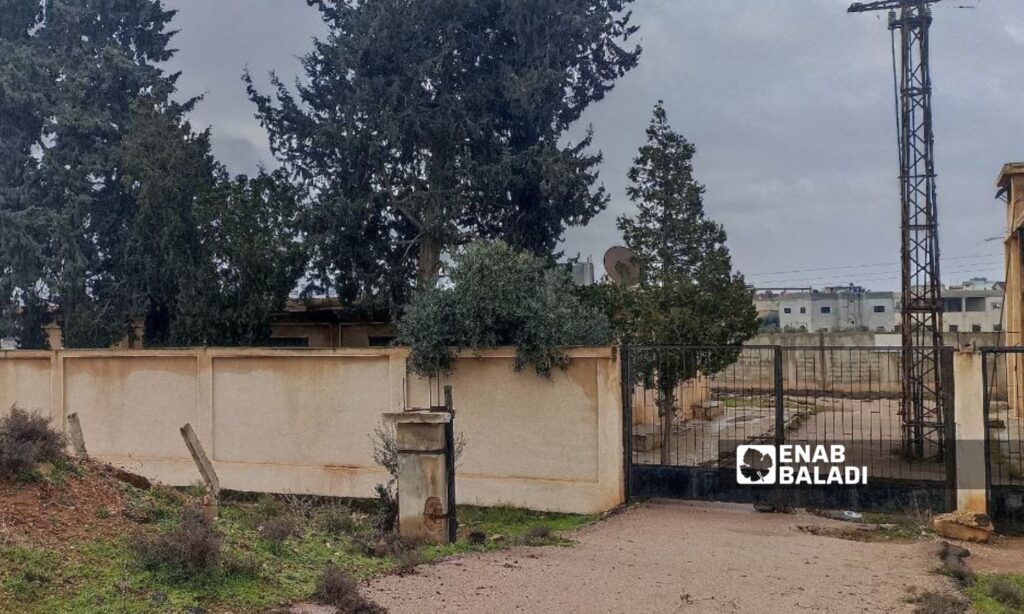Maaraba, a town in the eastern countryside of Daraa, grapples with a shortage of drinking water, forcing residents to purchase water through roaming tankers, with one cubic meter costing up to 20,000 Syrian pounds.
The main problem lies in the insufficiency of the public wells to meet the needs of the town, which has a population of around 15,000 people.
Encroachments on the main transmission line have hindered the delivery of water from the al-Thawra project in the town of Kahil to the pumping station in Maaraba.
Mohammed al-Miqdad, 40 years old, a resident of the town, told Enab Baladi that he needs a tank with a capacity of five cubic meters per month at a cost of 100,000 Syrian pounds.
The US dollar is trading at 14,650 SYP according to the S-P Today website, which covers the trading rate of the Syrian pound to the dollar. At the start of the conflict in 2011, the dollar was trading at 47 pounds.
Al-Miqdad, who works in construction, added that these quantities suffice for his family with rationing on water consumption, noting that the amounts consumed are doubled for his relative who raises livestock.
Regarding the residents’ reliance on drinking water from roaming tankers, al-Miqdad said that the malfunction of the wells, failure to control encroachments on the main pumping station, frequent encroachments on supply lines within the town, and deterioration of the network and valves are factors that have contributed to the insufficiency of water supplies for the town.
Corrupt society
The town is mainly supplied from the al-Thawra project from wells in the town of Kahil, located about ten kilometers west via the transmission line leading to Busra city, with a third of the quantity allocated for irrigating the town of Maaraba. However, this project has not fed the town since 2013 due to encroachments on the main line.
A former local council member, who asked not to be named for security reasons, told Enab Baladi that several obstacles prevent the delivery of drinking water from the al-Thawra project to the town, the most significant being the encroachments on the main transmission line and on the “golden” electricity line, which secures constant power for the pumping stations.
The member added that there is a pumping station in Maaraba that receives water from the al-Thawra project, which pumps 1,500 cubic meters per day. Ideally, this quantity should reach the Maaraba pumping station for the town to benefit from a third of it, and the rest is pumped to the city of Busra. However, only 150 cubic meters reach the Maaraba station. As a result of the inability to suppress these violations, the al-Thawra project was abandoned in favor of drilling wells and connecting them to the network.
The town currently relies on water supply from three main wells, two operating on electricity and the other on solar energy.
According to al-Miqdad, a resident of the town, the well’s submersible pump broke down, and its repair cost 14 million Syrian pounds. After installing it, the pump malfunctioned again within a week.
A local council member attributed the breakdown to weak electricity and irregular supply, exacerbated by the numerous encroachments on the power lines. He added that the submersible pump broke down twice in December of the previous year, and the repair cost each time was nearly $1,000, raised from residents’ donations.
Meanwhile, there is a well in the town that operates on solar power and is located to the west.
A dignitary of the town, who requested anonymity, told Enab Baladi that the well’s production declined during the winter, particularly on cloudy and rainy days, and that the number of operating hours decreases in winter.
No deterrent penalties
Encroachments on electric lines and main transmission lines, as well as on the internal network, have disrupted the equitable distribution of drinking water, causing an insufficient supply for residents.
Al-Miqdad told Enab Baladi that the internal network faced encroachments as residents randomly pierced the network lines without considering remote or elevated areas.
A former local council member said that the solutions require deterrent penalties, including imprisonment and fines for violators.
He added that the region is under the control of the Eighth Brigade of the regime’s Military Security, which has carried out several “suppression campaigns” against violators by closing unauthorized openings and cutting off illegal electricity. However, the violators returned the next day with more significant violations; most installed electrical transformers on the power lines designated for the pumping stations to exploit them in operating wells for agriculture.
Other solutions, according to the member, include drilling two additional wells, equipping them with solar power systems, and conducting internal maintenance of the network.

